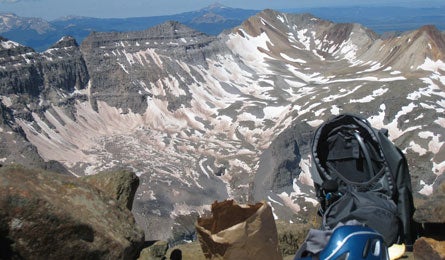Prof. Hike: Ode to a Plastic Bag

'Paper or plastic--don't lose a bag up here. (Jason Stevenson)'
The famous Scots poet Robbie Burns so loved his haggis that he penned a poem about it. Haggis, if you haven’t tried this delicacy, is a boiled mush of animal organs, oatmeal, and spices stuffed in a bulging sheep’s stomach. When Scots gather to celebrate Robert Burns’ birthday (January 25th), haggis is served as the culinary centerpiece—the equivalent of turkey on Thanksgiving.
But how could a dish so vile inspire so much adoration; not to mention a poem by the same man who wrote Auld Lang Syne? It must be that haggis has a dual nature—both loved and hated as a permanent fixture of Scots tradition.
For hikers, that same duality applies to plastic bags. We hate seeing bags littering the trail, fluttering in tree branches, or clinging to a river bank. But when packing for a trip, most hikers rely on these bags to stow and waterproof their gear. Meriwether Lewis and John Wesley Powell conquered the West without low-density polyethylene, but many of us couldn’t imagine life without it. After all, a zip-top bag will protect your camera during a sudden downpour, while a large garbage bag can save your life a dozen different ways.
So how should hikers approach the dual nature of plastic bags on the trail? Try following these three concepts:
>> Keep them
Never bury plastic bags, drop them down a latrine, or let them blow away. All the plastic you carry into the woods should leave with you. Since plastic doesn’t degrade like organic trash, those flimsy grocery store bags could persist for hundreds of years underground.
>>Re-use them
Wash zip-top bags when you get home to use them again on a future trip. Durable freezer-style bags can withstand several wash cycles before they develop creases and holes. Worn-out bags can still store gear at home. Garbage and grocery bags won’t last as long as zipper-top bags, but they can still survive several outings. However, I wouldn’t recommend re-using any bags that held trash, toilet paper, or human waste.
>>Store them
Maintain a stash of various plastic bags in your gear closet. When packing for a trip, root around this “bag of bags” to find the right sack to secure a waterproof jacket, a pair of camp sandals, or spare batteries. The more bags you possess the more uses you’ll discover for them.
Has a plastic bag ever saved your camera… or your life? Share your best stories in the comments below, or send an email to profhike@backpacker.com.
—Jason Stevenson